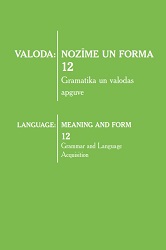Sufiksa -ul- desemantizēšanās Latvijas vietvārdos
Desemantization of suffix -ul- in Latvian place names
Author(s): Anita PaidereSubject(s): Morphology, Lexis, Semantics, Baltic Languages
Published by: Latvijas Universitātes Akadēmiskais apgāds
Keywords: desemantization; suffix; toponymy; motivation word; transonymization;
Summary/Abstract: The article analyses desemantization of suffix -ul-, illustrating it with examples of Latvian toponyms. Place names that are homonymous with common nouns can give a valuable insight into the process of desemantization involved in the process of grammaticalization. Research also considers derivation with two suffixes -ul- + -āj-, which can be seen as result of loss of initial semantics of suffix -ul-. Most of such derived names are motivated by Latvian tree-names: priede ‘pine’, apse ‘aspen’, bērzs ‘birch’ and liepa ‘linden’. There are significantly more toponyms with two suffixes -ul- + -āj- than with only suffix -ul-. The most popular name of this group is Priedulājs, nowadays especially frequent among Latvian oikonyms and ergonyms, earlier quite often found in the names of forests, meadows and swamps. In traditional onomastics, such cases are associated with transtoponymization and transonymization. Although using two suffixal (-ul- + -āj-) deriving for new substantives in Latvian language is not a very productive approach, the number of names that include Priedulājs / Priedulāji is increasing. It could be explained with the euphony of the name, although such a conclusion would need to be based on specific research, as well as surveys on the motivation for choosing a name.
Journal: Valoda: nozīme un forma
- Issue Year: 2021
- Issue No: 12
- Page Range: 195-207
- Page Count: 13
- Language: Latvian

